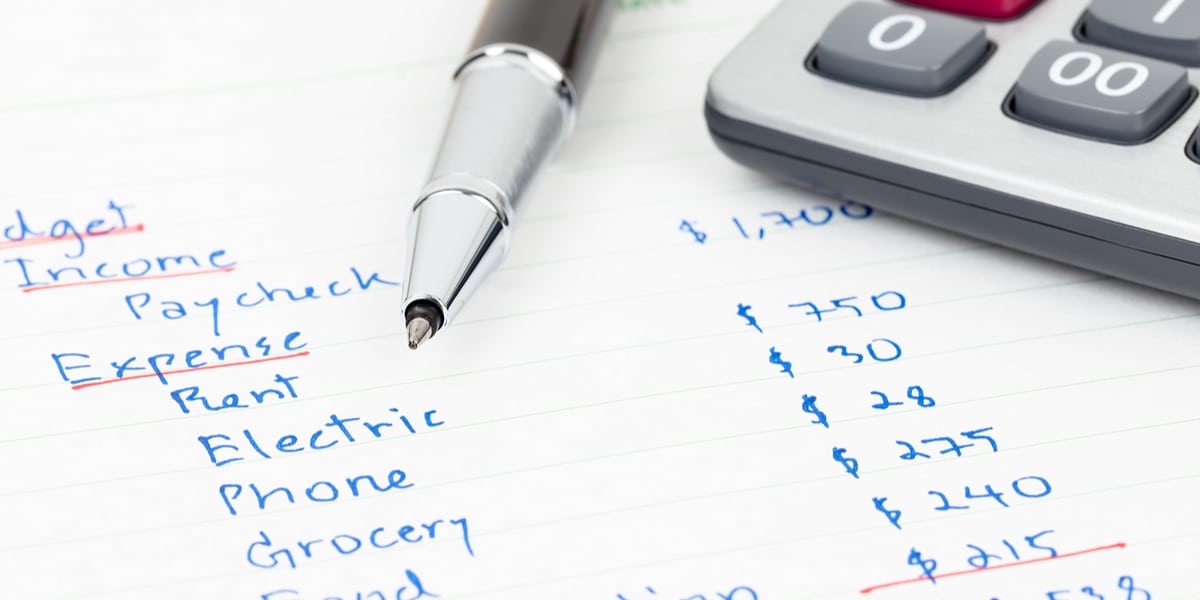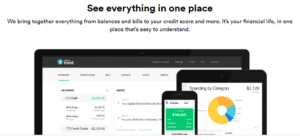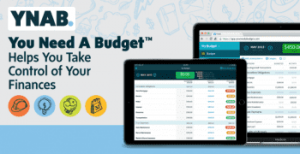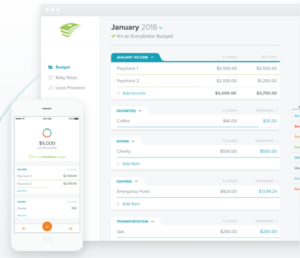
Now that January’s almost over, most folks have either formed a solid habit or abandoned their lofty goals already. When it comes to money goals, I often see “sticking to the budget” as one that shows up this time of year. It’s the financial version of dieting, and usually ends up leaving feelings of guilt and defeat rather than victory and accomplishment.
Personally, I don’t think everyone has to keep a budget. They are a great tool for folks who have either spending problems or control issues (or perhaps you’re one and your spouse is the other!). However, if you don’t fall into either of these categories and have no problem hitting your short- and long-term financial goals, there’s not much point in budgeting.
There’s also nothing Biblical about budgeting. We see in Matthew 25:14-30 (Parable of the Talents) that we will be called to give an account of what we’ve done with the Master’s money, so a budget will help us know how we spend His resources. Proverbs 21:20 counsels us that “Precious treasure and oil are in a wise man’s dwelling, but a foolish man devours it.” In other words, it’s important that you don’t live hand-to-mouth, and a budget might help you plan accordingly. But a budget is just a tool to help us accomplish these and other overarching mandates.
Thankfully, there are some great tools out there to help. And there is a lot of variety regarding the types, methods, and philosophies of the various tools out there. So I’m going to break down some of the popular options out there to give you an overview of the choices. Hopefully at least one of these could be a good fit and help get you on the road to budgeting success!
Mint
Mint (www.mint.com) is probably my favorite of the online tools out there. It is one of the more robust tools and is completely free to use. It also takes only a minimal amount of work to maintain, which is a huge bonus for those that don’t want to spend hours each week updating their budget.
- Mint links to your online banking, credit, and investment accounts to track your transactions and net worth over time

- When you link your accounts, Mint will automatically pull in the past three months of historical transactions, so you can immediately see your spending habits and decide if any of them need to change
- Mint will learn from your categorizations as you go. This is a big plus if you frequently shop at the same places and want Mint to know how to categorize these expenses.
- Mint has a customizable budgeting tool. It took me a while to understand the beauty of this. Essentially, Mint doesn’t make you set a budget for every category, but only for the ones you want to track. There’s not much point in having a mortgage budget (outside of making sure it fits into your overall plan) as the expense won’t change from month to month. Instead, you can leave those utility costs and others out and focus on the categories that might give the most trouble such as eating out, shopping, entertainment, etc.
- Mint has an app for your phone or tablet to easily check in with how things are going, get alerts if you are close to going overbudget in a category, etc.
- Mint has a great reporting feature that will track your income, spending, net income, and net worth over time, so you can see your long-term progress.
You Need A Budget (YNAB)
YNAB (www.youneedabudget.com) is a bit more of an intensive budgeting tool. The philosophy is to give every dollar a job as soon as you receive it. Don’t let anyone else tell you how you should spend money, but allocate it to those things that are truly important. And it puts an emphasis on planning ahead for things like car repairs, Christmas, etc., which I personally love.
- Like Mint, YNAB will link to your bank accounts to manually import transactions.
- Because it wants a job for each and every dollar, you can’t skip any categories or expenses. You have to reconcile everything, which is a needed step for folks with spending problems or control issues, but it can be a bit cumbersome for “casual budgeters”.
- Like Mint, it has a great phone app to help keep track of your budget while on the go.
- The major downside is that YNAB isn’t free. After a 34-day free trial (34??), there is a monthly fee of $6.99. This is a bit on the steep end to me, but it could be worth it if you really want to control every expense. They do promise a full refund if you don’t find you have more control over your money.
Every Dollar
Every Dollar (www.everydollar.com) is Dave Ramsey’s online budgeting tool. It is most similarly compared to YNAB, so I won’t go into it in detail, but here are the main differentiators:
- The free version allows you to set a budget, use the app, and enter transactions. But there is no linking to your bank accounts, so it can be a very manual experience.
- The paid version (linking accounts and automatically importing transactions) is a pretty close replica to YNAB, and costs $99/year. It makes you allocate every dollar (hence the name), and ties into Dave’s Baby Steps to help you reach your short- and long-term goals.
In my opinion, the free version could be good for folks who don’t mind spending 30 minutes a week entering expenses and will do this consistently. The paid version is more expensive than YNAB and I don’t see any significant advantages.
Envelope System
I have a number of clients who have lived off the envelope system for years and swear by it. I personally hate having cash so I’ve never actually tried this. The main philosophy here is that when we actually hand someone cash, it feels different than swiping a card, and we tend to spend less that way. Folks that follow this system swear that it’s true.
- Simply get an envelope for each spending category and put the budgeted amount of expenses in each envelope. When the money’s gone, that’s all the spending you can do in that category for the month.
- If you go this route, in my opinion there is nothing beneficial about having an envelope for the gas bill. Please pay your gas bill even if it’s more than you budgeted! And for Pete’s sake, this is 2019 – if you don’t have your utilities set up on auto-pay by now, stop reading this and go do that right now!!
- Some people are okay “robbing Peter to pay Paul”, moving money from one envelope to another, while others are more rigid about their spending categories.
- The downsides to this are you need to be constantly dealing in cash and have enough cash with you for “unexpected” expenses. Also, you are foregoing any points you could be earning with a credit card. But you never have to worry about interest or late fees.
A few tips
There are many, many more options out there, but this should at least get you started. Again, there’s nothing magical about any of these, and each could be a good fit depending upon your personality and desires. Here are a few tips to make your budgeting life easier no matter which you choose:
- Stop writing checks! Whether it’s for utilities, to pay your housekeeper, or to send money to Aunt Sue, checks just show up as Check 1001 on your bank statement and you will have to manually enter these transactions. Plus you may need to be paying postage and taking the time to write them out. Instead, set up regular check recipients on your online bill pay through your bank, and send money this way. This way when you pay Aunt Sue, your online budgeting software should pull it in as “Aunt Sue” vs “Check 1001” and it can categorize it for you as a gift, etc. And your bank will pay the postage for you.
- Commit to any system for 90 days. Each of these has a learning curve. The habits form quickly, but they still take a bit of time and energy. If you still don’t like it after 90 days, switch systems and try something else.
- Remember the point. No matter which system you choose, they are at some point going to require you to have some self-control. If you said your eating out budget was $150, and you’ve spent it, then you need to decide ahead of time how you’re going to handle those situations. If you’re going to just keep spending anyways, there’s not much of a point to the budget. If you can say no to yourself, or teach yourself to space out the spending throughout the month, then you will form new spending habits which will start to kick into auto-pilot after several months.
- Whenever you budget, make sure to account for all of the “expected unexpected” expected. This is things like new tires, going to a wedding, medical bills and so on. They’re expected in that you know they will happen as a part of life, but unexpected in that you don’t know precisely when or how much they’ll cost. You can itemize and plan out for these individually, or lump them together in a category like “infrequent expenses”. But these aren’t emergencies (because they’re expected) and you shouldn’t be using your emergency fund for them.
Way more important than which categories you spend on is the bigger picture budget. Do the important things first. Start with tithing your income. Then make sure you are paying back any liabilities you owe and setting aside enough for income taxes. Next comes savings. A rule of thumb is 10-15% of your income but every situation is different so give us a call if you need help targeting the right amount. If you’re doing this big picture stuff well, just focus on keeping your cash levels the same from month to month and the rest is insignificant.
Focus on stewardship. God cares way more about your heart than your budget, or your money for that matter. Acknowledge him as the Owner. Don’t spend everything you earn. Do your spending after you give generously and save diligently.
This is far from exhaustive but it should get you pointed in the right direction. Please let us know if there’s anything we can do to help get you on the road to financial success!
BACK TO NEWS



